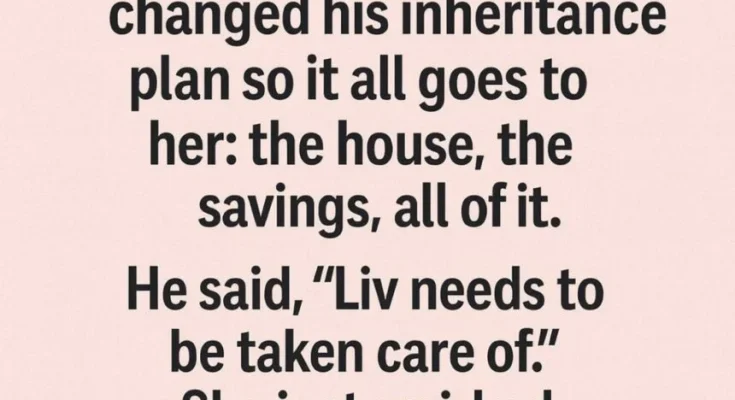How One Dinner Talk Helped Mend Years of Silence Between Me, My Dad, and His Young Wife
My dad’s new wife, Liv, is younger than me. That sentence still feels strange to say out loud. When they first told me about their relationship, I tried very hard to be “the mature one.” I smiled, I said all the right things, I congratulated them.
But under all that politeness, there was a knot in my chest I couldn’t quite untangle. It wasn’t that Liv had done anything wrong. She was friendly enough, always asking how work was going, complimenting my outfit, offering to refill my glass at dinner.
But every interaction felt just a little off, like we were both reading from a script neither of us had written. She was my dad’s new wife. She was younger than me.
And I didn’t know what box to put her in. Was she supposed to be some sort of stepmother? A peer?
A stranger sharing my father’s last name? So I settled for neutral: polite, distant, and always very careful. The Day Everything Shifted
Then, last month, my dad called and asked if we could talk.
We met at his house. Liv made tea and then quietly disappeared into another room, leaving us alone in the kitchen. My dad fidgeted with his mug, which is how I knew it was serious—he only did that when he was nervous.
“I’ve updated my will,” he said, finally. “I wanted you to hear it from me.”
I nodded slowly. “Okay… what did you decide?”
He took a breath.
“I’ve decided to leave everything to Liv,” he said. “She needs to be looked after.”
The words stung, but what cut even deeper was the tiny, almost invisible smirk I caught on Liv’s face as she walked past the doorway a moment later. Maybe I misread it.
Maybe it was nerves. But the image stuck to my mind like glue. I drove home in silence that night, not angry enough to explode, but hurt enough that the quiet felt loud.
It wasn’t about the money. I have my own life, my own income. What pierced me was the feeling of being… replaced.
It felt like, somewhere along the line, I’d gone from “my dad’s child” to “someone he used to have responsibility for.” Like my chapter in his life was over, and hers was the only one that mattered now. Naming What Was Actually Wrong
Over the next few days, I kept trying to talk myself out of my own feelings:
You shouldn’t care about inheritance. You’re an adult.
It’s his life, his choice, his money. Maybe she really does need more security than you do. All those statements were true on paper.
And yet, the ache stayed. One evening, while I was half-watching TV and half-replaying the conversation in my head, it finally clicked: this had almost nothing to do with legal documents or bank accounts. I didn’t feel jealous.
I felt… unseen. It felt like Dad had made a major decision that symbolically wrote me out of the picture—and never really paused to ask how I might feel about that. What I wanted wasn’t a percentage of his assets.
What I wanted was to know I still mattered. The Dinner That Changed Everything
A week later, we met for dinner—Dad, Liv, and me. The air was tight from the start.
We did the usual small talk: traffic, work, weather, some story about the neighbor’s dog. But underneath, there was a heaviness none of us wanted to name. Halfway through the meal, I realized I had a choice: stay quiet and let resentment grow in the dark, or risk an uncomfortable conversation and see what happened.
My fork was still in my hand when I said it:
“Dad, can I ask you something?”
He looked up. “Of course.”
I took a breath. “When you changed your will… did you think about how that might feel for me?”
The words landed like a dropped glass.
Liv froze. My dad went completely still. No one spoke for a few seconds.
For the first time, Liv didn’t have that half-smile on her face. She just watched. Really watched.
My dad cleared his throat. “I… honestly didn’t think of it that way,” he said slowly. “I was worried about making sure Liv would be okay if something happened to me.
I didn’t mean to make you feel pushed aside.”
“That’s how it felt,” I said, keeping my voice as calm as I could. “Not because I want your money, but because it made me wonder where I fit in your life now.”
He stared at the table for a long moment, then looked back at me with eyes that were suddenly wet. “I’m sorry,” he said.
“I was so focused on not failing again in this relationship that I didn’t realize I was hurting you in the process.”
Hearing Her Side, Too
Liv shifted in her seat, then spoke up quietly. “I want to say something,” she said, glancing between us. “I never wanted to take your place.
I know I’m younger than you, and I know that probably feels strange. But I don’t want to be the reason you and your dad grow farther apart.”
She took a breath. “When he told me about his will, I was… scared.
I’ve seen people left with nothing after their partner died. I thought if I didn’t have financial security, our relationship wouldn’t be real. But I never stopped to think about what that looked like from your side.”
The smirk I thought I’d seen weeks before now looked more like nervous armor she didn’t know how to put down.
For the first time, it felt like we were three people at one table, not two on one side and one on the other. The tension shifted into something softer. Not magically “fixed,” but… honest.
What I Really Wanted
As the conversation continued, I realized something important:
I didn’t need my dad to promise me an equal share. I didn’t even need him to choose me over her. I just needed to know:
that I still mattered to him,
that he’d thought about how his choices affected our relationship,
and that I wasn’t being quietly written out of his story.
By the time dessert arrived, the three of us were talking like actual humans instead of characters playing assigned roles. Dad admitted he’d been terrified of losing another relationship and had overcorrected. Liv admitted she’d been insecure about being seen as “the young wife” and clung to financial security as proof of her place.
I admitted that I’d been carrying years of quiet distance toward my dad and using Liv as the easiest symbol of that gap. Somewhere between the last bites and the check arriving, my dad said:
“I want to rethink my plans. Not because you asked me to, but because I want both of you to feel respected.
We’ll talk to a lawyer and work out something that reflects that.”
Liv nodded. “I’d feel better about that too,” she added. “I don’t want to ‘win’ by making you lose.”
What Actually Changed
In the days that followed, the legal details began to shift—yes.
But more importantly, the emotional landscape did. My dad started calling more, not just to share news, but to ask how I was feeling. Liv and I began texting occasionally on our own: recipes, funny memes, small bits of everyday life.
When I visited, the vibe slowly changed from “guest in their house” to “family figuring out a new shape.”
Nothing became perfect overnight. There are still awkward moments. There are still reminders that my dad’s wife is closer to my age than his.
But something fundamental changed that night:
We stopped pretending everything was fine and actually talked about what hurt. What That Dinner Taught Me
Looking back, that dinner didn’t just “fix the will situation.”
It did something much more important:
It reminded me that families are not undone by change—they’re undone by the feelings no one talks about. It would’ve been easy to stay silent:
To collect quiet resentment like dust.
To roll my eyes at Liv in private and avoid my dad. To tell myself, “Fine, if that’s how he feels, he can live with his choices.”
Instead, one honest question opened a door:
“Did you think about how this would feel for me?”
That question didn’t accuse. It revealed.
And once it was out in the open, my dad finally saw the part of the story he’d been missing: mine. If You’re in a Similar Place…
If you’ve ever felt quietly edged out by a parent’s new partner, or hurt by a decision that made you feel invisible, I won’t pretend there’s a simple fix. Not every conversation will end well.
Not every person will be willing to listen. But I learned this:
Sometimes the thing you’re angry about on the surface (a will, a house, money) is really a symbol for something deeper (belonging, love, acknowledgment). And sometimes, naming that deeper thing—gently but clearly—is what shifts everything.
That night at dinner didn’t magically erase years of distance between me and my dad. But it gave us something we hadn’t had in a long time:
A starting point. And sometimes, that’s enough.


